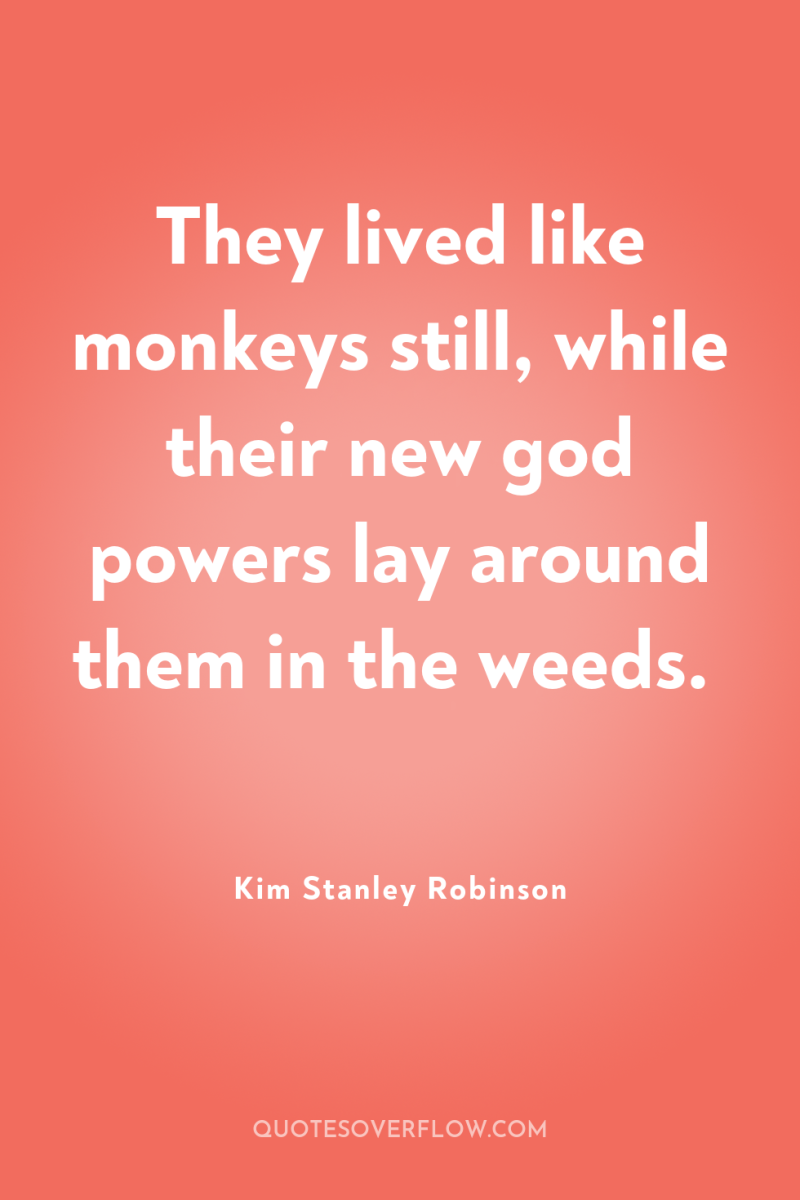
1
They lived like monkeys still, while their new god powers lay around them in the weeds.Kim Stanley Robinson
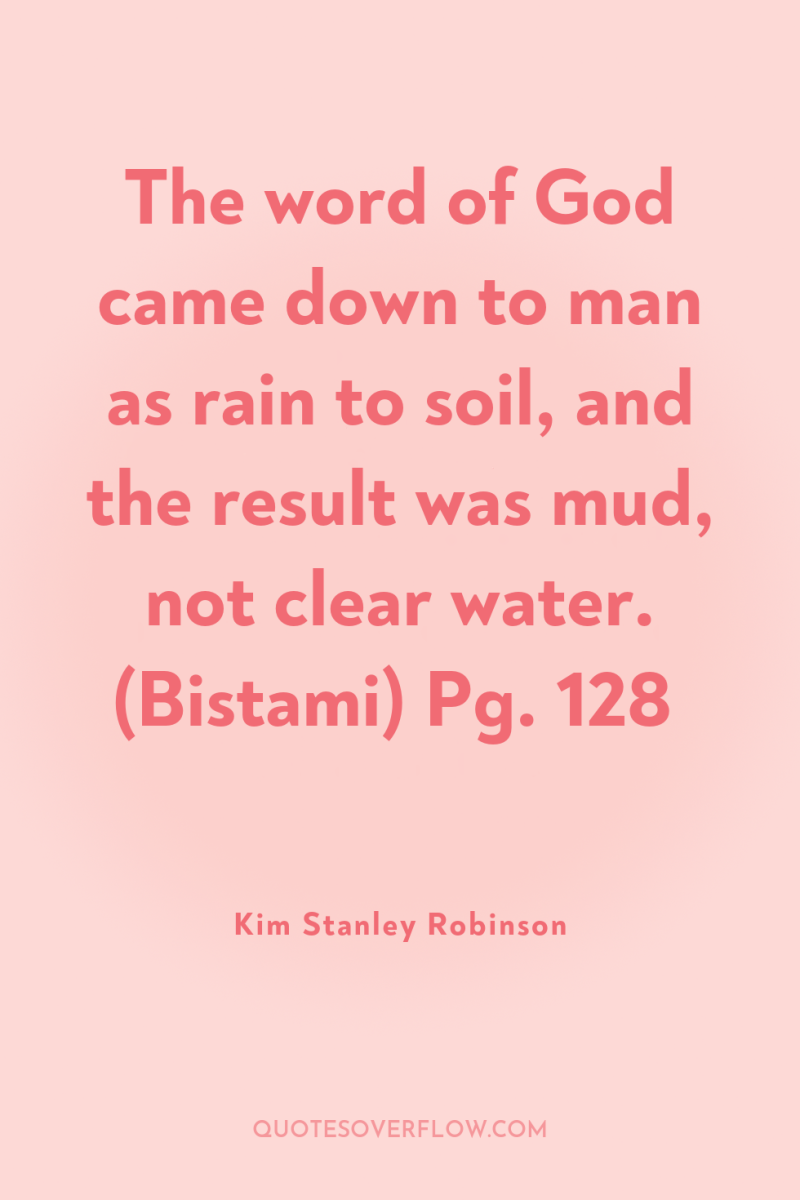
2
The word of God came down to man as rain to soil, and the result was mud, not clear water. (Bistami) Pg. 128Kim Stanley Robinson
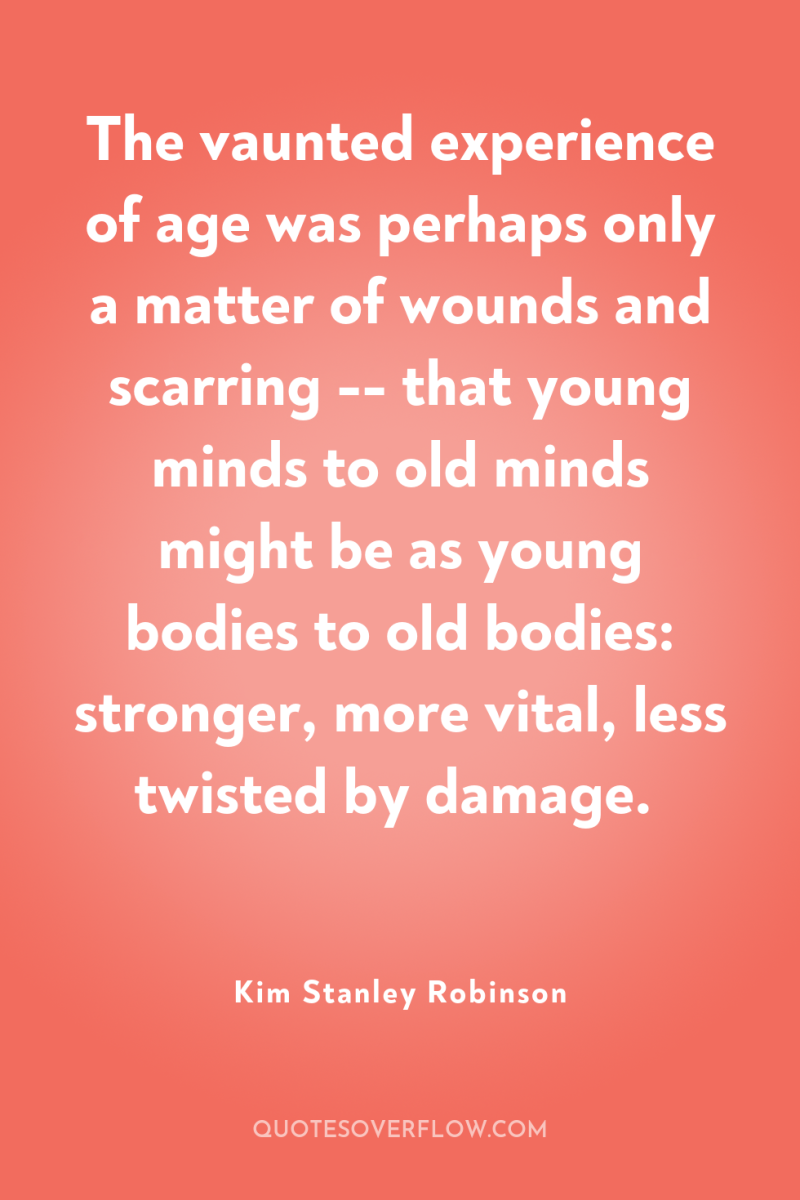
3
The vaunted experience of age was perhaps only a matter of wounds and scarring -- that young minds to old minds might be as young bodies to old bodies: stronger, more vital, less twisted by damage.Kim Stanley Robinson
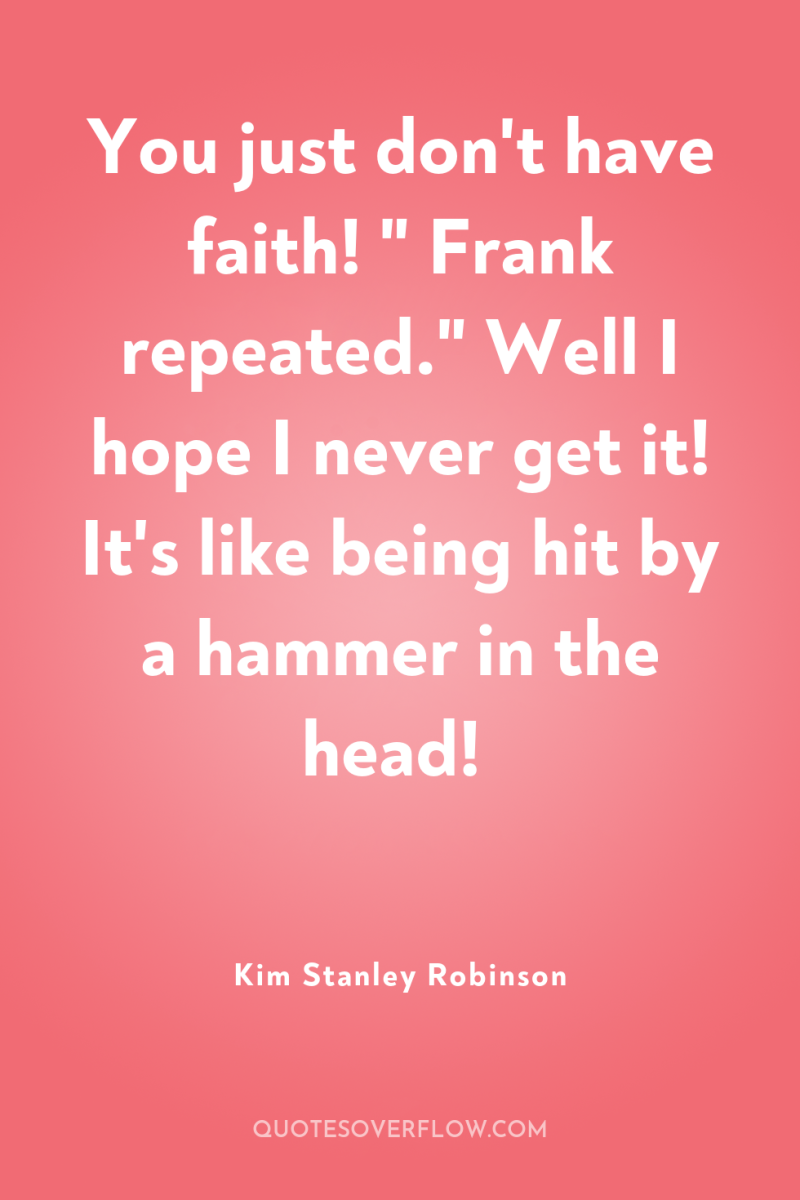
4
You just don't have faith! " Frank repeated." Well I hope I never get it! It's like being hit by a hammer in the head!Kim Stanley Robinson
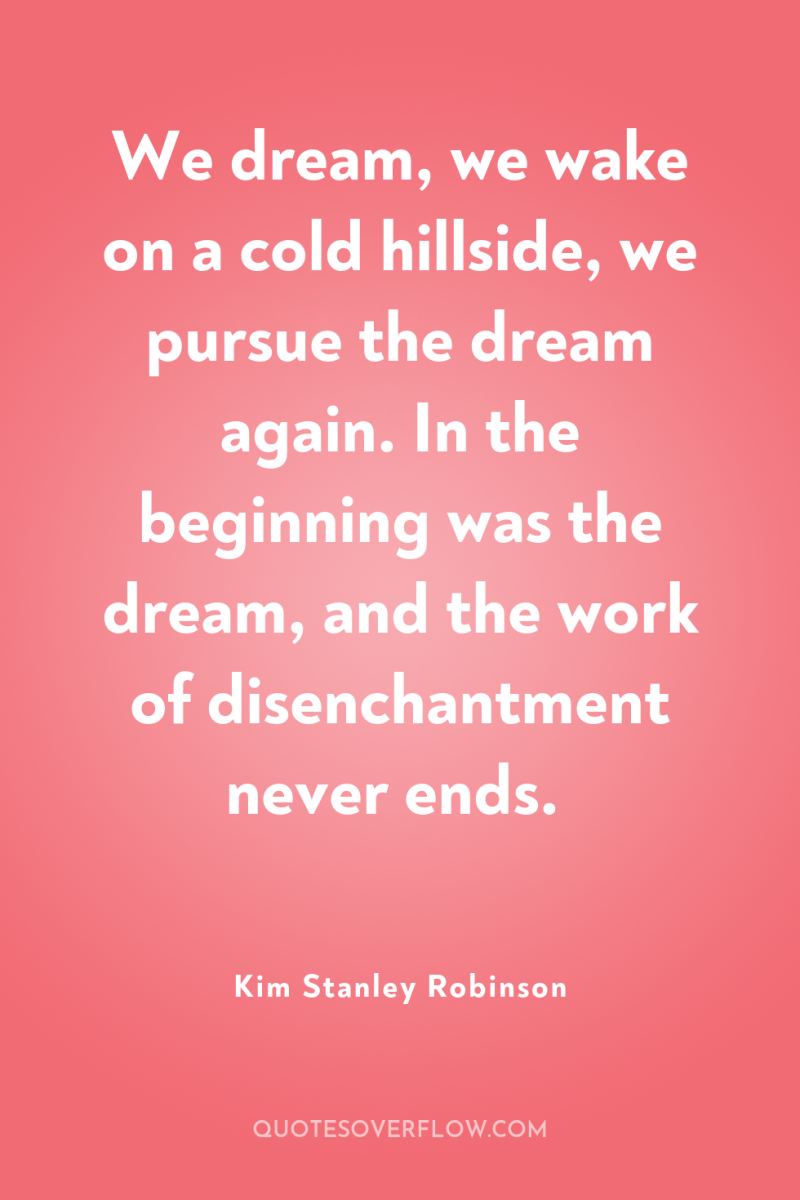
5
We dream, we wake on a cold hillside, we pursue the dream again. In the beginning was the dream, and the work of disenchantment never ends.Kim Stanley Robinson
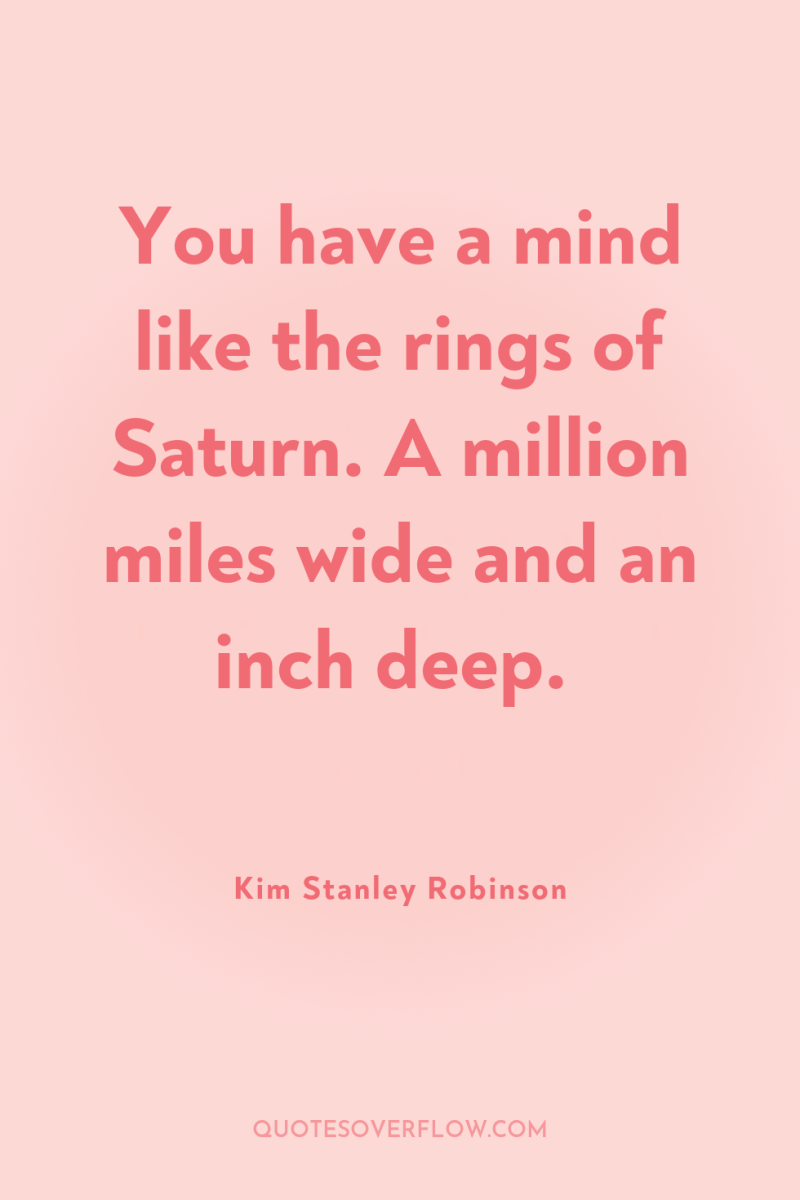
6
You have a mind like the rings of Saturn. A million miles wide and an inch deep.Kim Stanley Robinson
7
Economics was like psychology, a pseudoscience trying to hide that fact with intense theoretical hyperelaboration. And gross domestic product was one of those unfortunate measurement concepts, like inches or the British thermal unit, that ought to have been retired long before.Kim Stanley Robinson
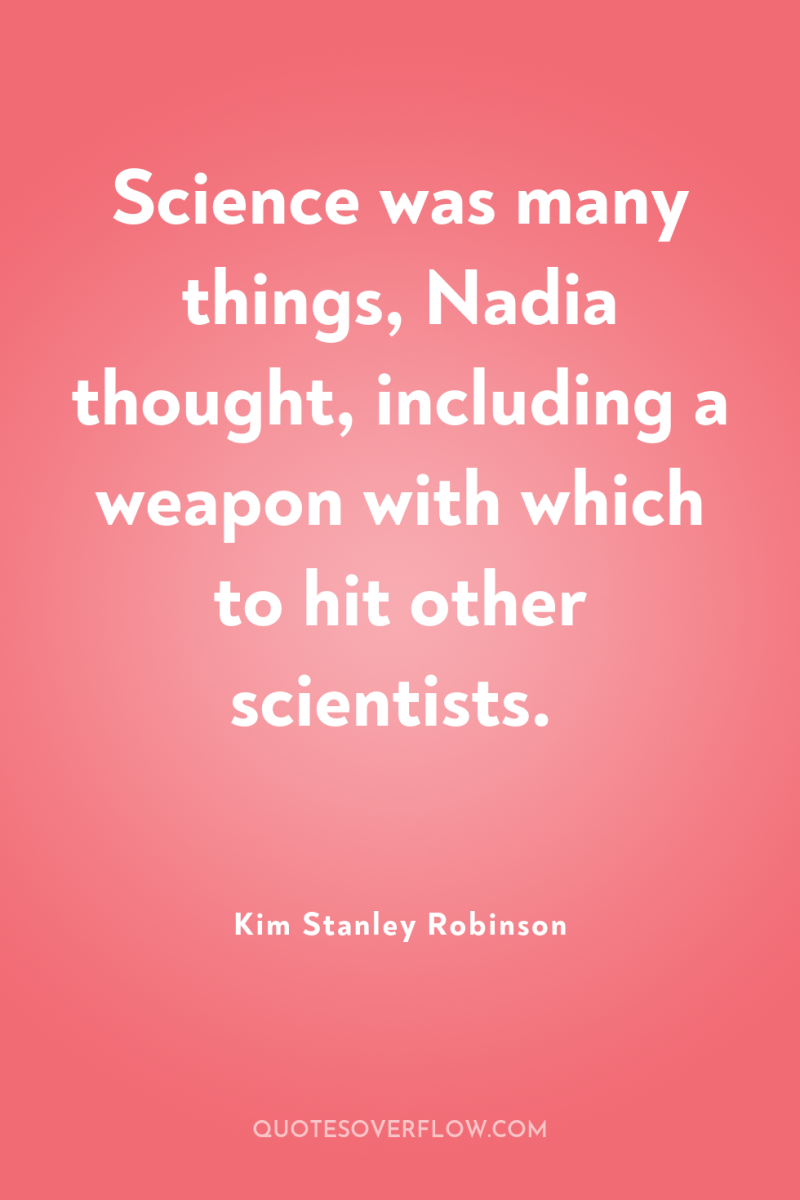
8
Science was many things, Nadia thought, including a weapon with which to hit other scientists.Kim Stanley Robinson
9
He pointed to another number, changing as rapidly as the first, but on a lower trajectory; it rose to a high of 8.79 rem per hour. Several lifetimes of dentists’ X-rays, to be sure; but the radiation outside the storm shelter would have been a lethal dose, so they were getting off lightly. Still, the amount flying through the rest of the ship! Billions of particles were penetrating the ship and colliding with the atoms of water and metal they were huddled behind; hundreds of millions were flying between these atoms and then through the atoms of their bodies, touching nothing, as if they were no more than ghosts. Still, thousands were striking atoms of flesh and bone. Most of those collisions were harmless; but in all those thousands, there were in all probability one or two (or three?) in which a chromosome strand was taking a hit, and kinking in the wrong way: and there it was. Tumor initiation, begun with just that typo in the book of the self. And years later, unless the victim's DNA luckily repaired itself, the tumor promotion that was a more or less unavoidable part of living would have its effect, and there would appear a bloom of Something Else inside: cancer. Leukemia, most likely; and, most likely, death.Kim Stanley Robinson
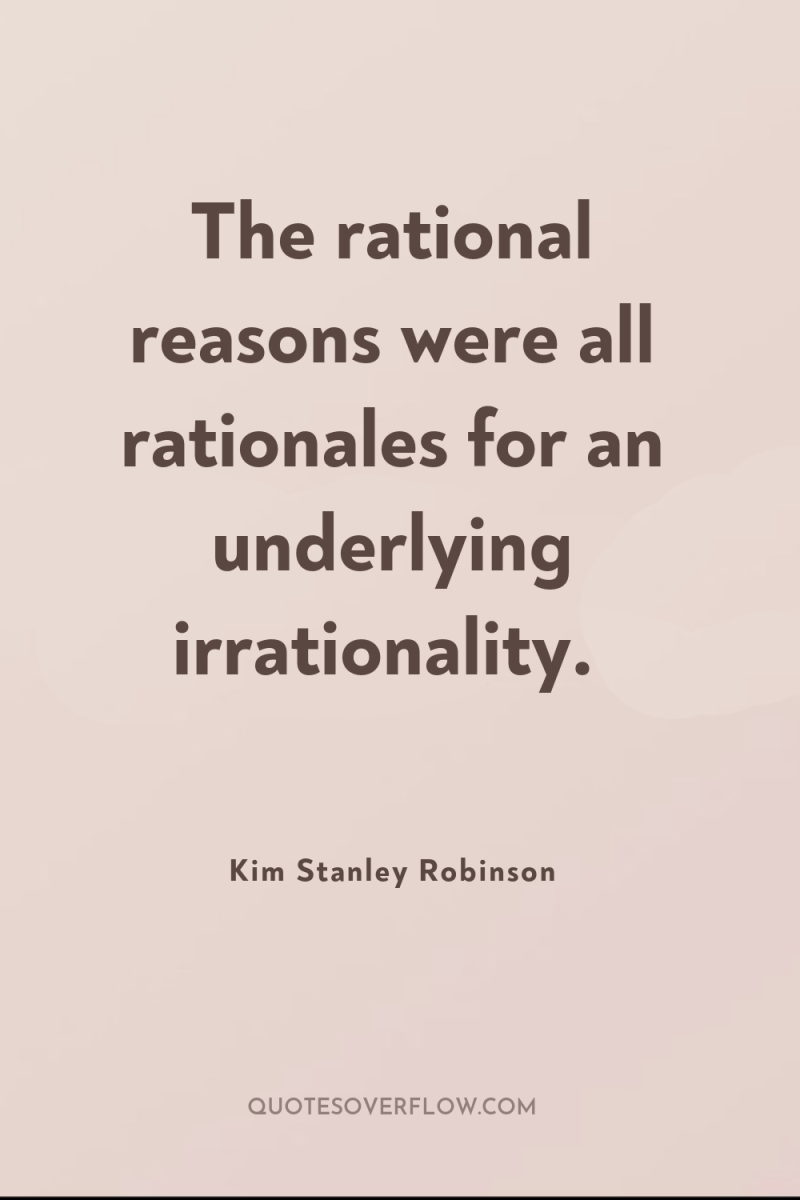
10
The rational reasons were all rationales for an underlying irrationality.Kim Stanley Robinson
11
And in this curious state I had the realization, at the moment of seeing that stranger there, that I was a person like everybody else. That I was known by my actions and words, that my internal universe was unavailable for inspection by others. They didn't know. They didn't know, because I never told them.Kim Stanley Robinson
12
A thug. In peacetime Fitch would be hanging around a pool table giving the cops trouble. He was perfect for war. Tibbets had chosen his men well - most of them, anyway. Moving back past Haddock January stopped to stare at the group of men in the navigation cabin. They joked, drank coffee. They were all a bit like Fitch: young toughs, capable and thoughtless. They're having a good time, an adventure. That was January's dominant impression of his companions in the 509th; despite all the bitching and the occasional moments of overmastering fear, they were having a good time. His mind spun forward and he saw what these young men would grow up to be like as clearly as if they stood before him in businessmen's suits, prosperous and balding. They would be tough and capable and thoughtless, and as the years passed and the great war receded in time they would look back on it with ever-increasing nostalgia, for they would be the survivors and not the dead. Every year of this war would feel like ten in their memories, so that the war would always remain the central experience of their lives - a time when history lay palpable in their hands, when each of their daily acts affected it, when moral issues were simple, and others told them what to do - so that as more years passed and the survivors aged, bodies falling apart, lives in one rut or another, they would unconsciously push harder and harder to thrust the world into war again, thinking somewhere inside themselves that if they could only return to world war then they would magically be again as they were in the last one - young, and free, and happy. And by that time they would hold the positions of power, they would be capable of doing it. .Kim Stanley Robinson
13
They were so ignorant! Young men and women, educated very carefully to be apolitical, to be technicians who thought they disliked politics, making them putty in the hands of their rulers, just like always. It was appalling how stupid they were, really, and he could not help lashing into them.Kim Stanley Robinson
14
He was not interested in what they were doing, not any of it– it was both ugly and abstract, a continuous manipulation of people devoid of any of the tangible rewards that so much work had. That’s politics....Kim Stanley Robinson
15
The triviality of the current scene usually put her off, but now she supposed that the politics of the moment always looked petty and stupid; only later did it take on the look of respectable statecraft, of immutable History.Kim Stanley Robinson
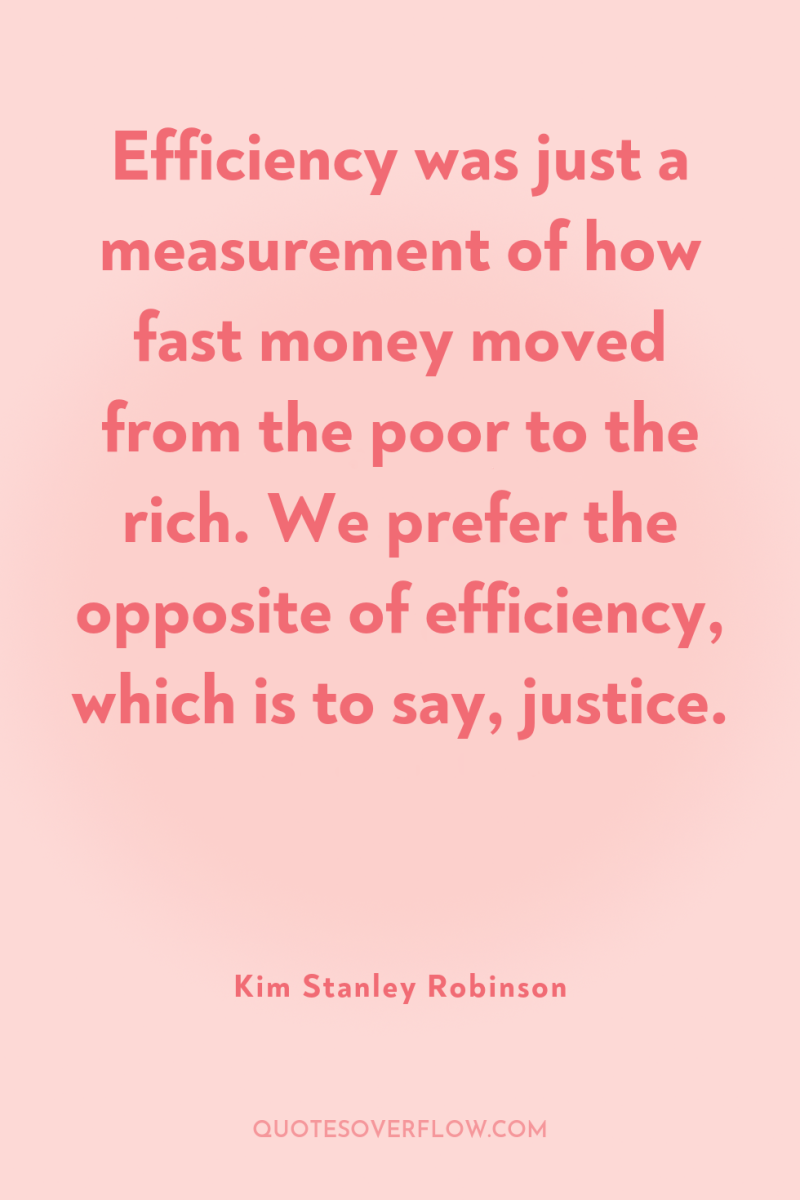
16
Efficiency was just a measurement of how fast money moved from the poor to the rich. We prefer the opposite of efficiency, which is to say, justice.Kim Stanley Robinson
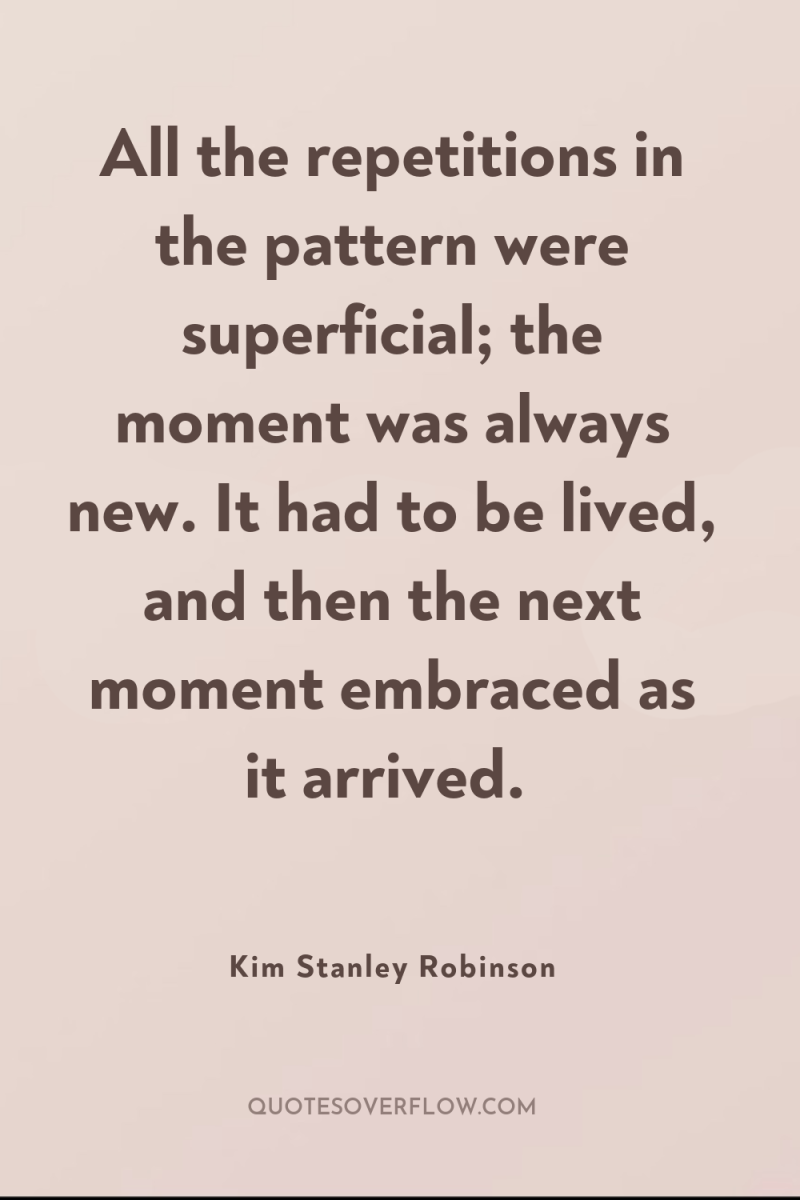
17
All the repetitions in the pattern were superficial; the moment was always new. It had to be lived, and then the next moment embraced as it arrived.Kim Stanley Robinson
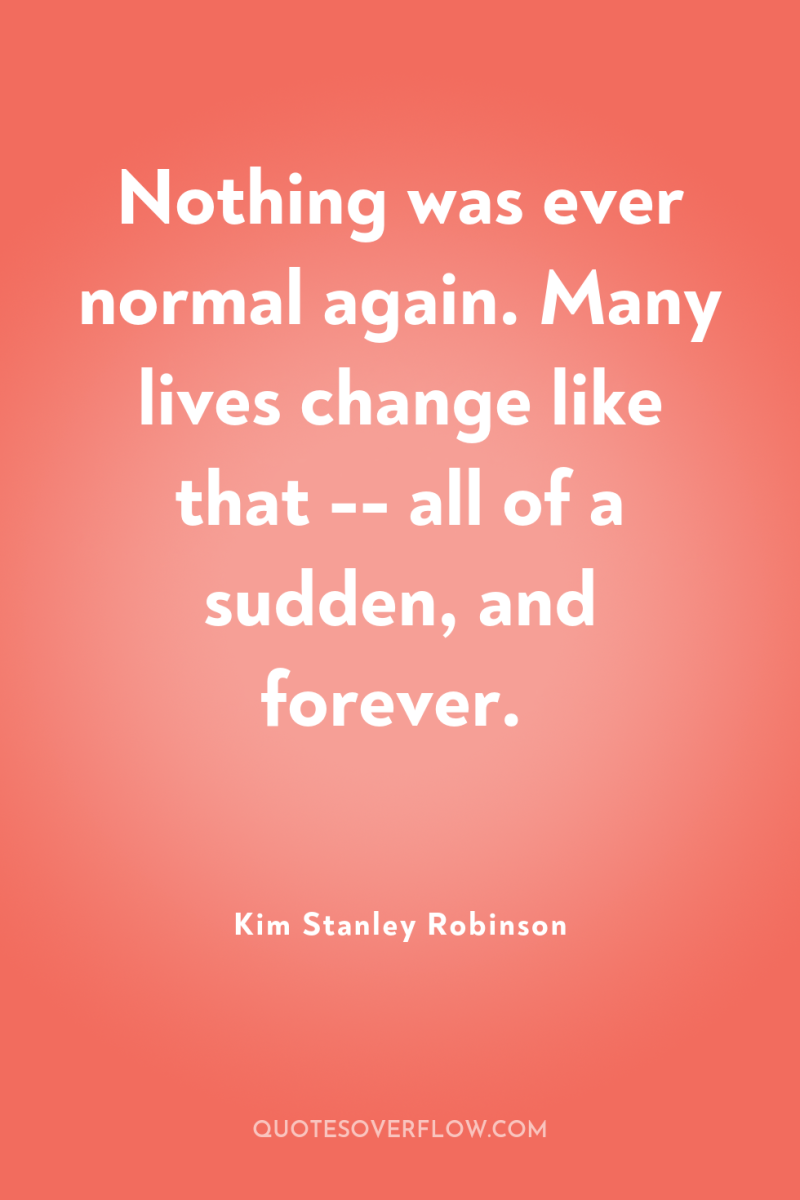
18
Nothing was ever normal again. Many lives change like that -- all of a sudden, and forever.Kim Stanley Robinson
19
The beauty of Mars exists in the human mind, ” he said in that dry factual tone, and everyone stared at him amazed. “Without the human presence it is just a collection of atoms, no different than any other random speck of matter in the universe. It’s we who understand it, and we who give it meaning. All our centuries of looking up at the night sky and watching it wander through the stars. All those nights of watching it through the telescopes, looking at a tiny disk trying to see canals in the albedo changes. All those dumb sci-fi novels with their monsters and maidens and dying civilizations. And all the scientists who studied the data, or got us here. That’s what makes Mars beautiful. Not the basalt and the oxides .Kim Stanley Robinson
20
Individuals make history, but it's also a collective thing, a wave that people ride in their time, a wave made of individual actions. So ultimately history is another particle/wave duality that no one can parse or understand.Kim Stanley Robinson
21
All the great moments of history have taken place inside people’s heads.Kim Stanley Robinson
22
Humans were still not only the cheapest robots around, but also, for many tasks, the only robots that could do the job. They were self-reproducing robots too. They showed up and worked generation after generation; give them 3000 calories a day and a few amenities, a little time off, and a strong jolt of fear, and you could work them at almost anything. Give them some ameliorative drugs and you had a working class, reified and coglike. .Kim Stanley Robinson
23
Because life is robust, Because life is bigger than equations, stronger than money, stronger than guns and poison and bad zoning policy, stronger than capitalism, Because Mother Nature bats last, and Mother Ocean is strong, and we live inside our mothers forever, and Life is tenacious and you can never kill it, you can never buy it, So Life is going to dive down into your dark pools, Life is going to explode the enclosures and bring back the commons, O you dark pools of money and law and quantitudinal stupidity, you oversimple algorithms of greed, you desperate simpletons hoping for a story you can understand, Hoping for safety, hoping for cessation of uncertainty, hoping for ownership of volatility, O you poor fearful jerks, Life! Life! Life! Life is going to kick your ass.Kim Stanley Robinson
24
I grew up in a utopia, I did. California when I was a child was a child's paradise, I was healthy, well fed, well clothed, well housed. I went to school and there were libraries with all the world in them and after school I played in orange groves and in Little League and in the band and down at the beach and every day was an adventure.. .. I grew up in utopia.Kim Stanley Robinson
25
The idea that each corporation can be a feudal monarchy and yet behave in its corporate action like a democratic citizen concerned for the world we live in is one of the great absurdities of our time–Kim Stanley Robinson
26
In China the egalitarian movement came not just from Zhu's vision, but also the Taoist ideas of balance, as Zhu would always point out. In Travancore it rose out of the Buddhist idea of compassion, in Yingzhou from the Hodenosaunee idea of the equality of all, in Firanja from the idea of justice before God. Everywhere the idea existed, but the world still belonged to a tiny minority of rich; wealth had been accumulating for centuries in a few hands, and the people lucky enough to be born into this old aristocracy lived in the old manner, with the rights of kings now spread among the wealthy of the Earth. Money had replaced land as the basis of power, and money flowed according to its own gravity, its laws of accumulation, which though divorced from nature, were nevertheless the laws ruling most countries on Earth, no matter their religious or philosophical ideas of love, compassion, charity, equality, goodness, and the like. Old Zhu had been right: humanity's behavior was still based on old laws, which determined how food and land and water and surplus wealth around, how the labor of the eight billions was owned. If these laws did not change, the living shell of the earth might well be wrecked, and inherited by seagulls and ants and cockroaches.Kim Stanley Robinson
27
You can't choose your childhood, it's just what happens to you. But after that you choose. And that's really what (makes you).Kim Stanley Robinson
28
It was a world of acts, and words had no more influence on acts than the sound of a waterfall has on the flow of the stream.Kim Stanley Robinson
29
It was that sort of sleep in which you wake every hour and think to yourself that you have not been sleeping at all; you can remember dreams that are like reflections, daytime thinking slightly warped.Kim Stanley Robinson
30
Childhood isn't just those years. It's also the opinions you form about them afterward. That's why our childhoods are so long.Kim Stanley Robinson
31
It is a long time ago. So many lives ago-- I get them all confused, don’t you?Kim Stanley Robinson
32
The people are suffering. Relieving people’s poverty ought to be handled as though one were rescuing them from fire, or saving them from drowning. One cannot hesitate.Kim Stanley Robinson
33
Desire is life trying to continue to be life. All living things desire, bacteria feel desire. Life is wanting.Kim Stanley Robinson
34
There are no secrets, there is no mystery. We make that all up. In fact, it's all right there in front of us. You have to have enough food to get through winter and spring. That's what it all comes down to. You have to live in a way that will gather enough food each fall to get through winter.Kim Stanley Robinson
35
They tell each other what they are thinking. But there is no reason to believe anything they say.Kim Stanley Robinson
36
If democracy and self-rule are the fundamentals, then why should people give up these rights when they enter their workplace? In politics we fight like tigers for freedom, for the right to elect our leaders, for freedom of movement, choice of residence, choice of what work to pursue– control of our lives, in short. And then we wake up in the morning and go to work, and all those rights disappear. We no longer insist on them. And so for most of the day we return to feudalism. That is what capitalism is– a version of feudalism in which capital replaces land, and business leaders replace kings. But the hierarchy remains. And so we still hand over our lives’ labor, under duress, to feed rulers who do no real work. .Kim Stanley Robinson
37
The intense thereness of it-haecceity Sax had called it once, when John had asked him something about his religious beliefs- I believe in haecceity, Sax had said, in thisness, in here-and-nowness, in the particular individuality of every moment. That's why I want to know what is this? what is this? what is this? Now, remembering Sax's odd word and his odd religion, John finally understood him; because he was feeling the thisness of the moment like a rock in his hand, and it felt as if his entire life had been lived only to get him to this moment.Kim Stanley Robinson
38
For me, art in our time is strongest when it is aware of science, includes science, is inspired by science, or is about science. On the linguistic level, the new words coined by scientists to describe their new discoveries form a giant growing lexicon that means English is simply bursting with new possibilities, resembling the Elizabethan age in that respect. Then conceptually, science is creating new stories to tell, by deluging us with new information and potentialities. In this deluge we need art to do its usual job of sorting things out, by giving things their human dimension and by exploring how they might feel and what they might mean. So to me the arts and the sciences are completely intertwined. Maybe that's always been true, but now more than ever.Kim Stanley Robinson
39
Bold didn’t know what he felt, it changed minute by minute.Kim Stanley Robinson
40
Sad but true: individual intelligence probably peaked in the Upper Paleolithic, and we have been self-domesticated creatures ever sinceKim Stanley Robinson
41
The one who tells the stories rules the world.Kim Stanley Robinson
42
They could do anything. That, however, was part of what made it difficult to bring [it] to a close. Infinite possibility was going to collapse, in the act of choosing, to the single world line of history. The future becoming the past: there was something disappointing in this passage through the loom, this so-sudden diminution from infinity to one, the collapse from potentiality to reality which was the action of time itself. The potential was so delicious– the way they could have, potentially, all the best parts of all..time, combined magically into some superb, as-yet-unseen synthesis– or throw all that aside, and finally strike a new path to the heart of just government.To go from that to the mundane problematic..was an inevitable letdown, and instinctively people put it off.Kim Stanley Robinson
43
Here they were, on the only planetary surface on which you could walk freely, naked to the wind and the sun, and when they had a choice, they sat in boxes and stared at littler boxes, just as if they had no choice-as if they were in a space station-Kim Stanley Robinson
44
You can only kill disappointment with a new try.Kim Stanley Robinson
45
Allah protect us, ' Bold said politely. Then, in Arabic, 'In the name of God, the merciful, the compassionate.' In his years in Temur's army he had learned to be as much a Muslim as anyone. The Buddha did not mind what you said to be polite.Kim Stanley Robinson
46
In a capitalist world, the word capital has taken on more and more uses.. .. human capital, for instance, which is what labor accumulates through education and work experience. Human capital differs from the classic kind in that you can't inherit it, and it can only be rented, not bought or sold.Kim Stanley Robinson
47
So it’s democracy versus capitalism at this point, friends, and we out on this frontier outpost of the human world are perhaps better positioned than anyone else to see this and to fight this global battle, there’s empty land here, there’s scarce and nonrenewable resources here, and we’re going to get swept up into the fight and we cannot choose not to be part of it, we are one of the prizes and our fate will be decided by what happens throughout the human world. That being the case, we had better band together for the common good, for Mars and for us and for all the people on earth and for the seven generations, it’s going to be hard it’s going to take years, and the stronger we are the better our chances, which is why I’m so happy to see that burning meteor in the sky pumping the matrix of life into our world, and why I’m so happy to see you all here to celebrate it together, a representative congress of all that I love in this world, but look I think that steel-drum band is ready to play aren’t you” (shouts of assent) “so why don’t you folks start and we’ll dance till dawn and tomorrow scatter on the winds and down the sides of this great mountain, to carry the gift everywhere.Kim Stanley Robinson
48
We demand justice, " Jeff says. "we don't have it, the world is a mess because of assholes who think they can steal everything and get away with it. So we have to overwhelm them and get back to justice."" And conditions are ripe, is that what you're saying?"" Very ripe. People are pissed off. They're scared for their kids. That's the moment things can tip. If it works like Chenoweth's law says it does, then you only need about fifteen percent of a population to engage in civil disobedience, and the rest see it and support it, and the oligarchy falls. You get a new legal regime. It doesn't have to get all bloody and lead to a thugocracy of violent revolutionaries. If can work. And conditions are ripe.Kim Stanley Robinson
49
That's a large part of what economics is - people arbitrarily, or as a matter of taste, assigning numerical values to non-numerical things. And then pretending that they haven't just made the numbers up, which they have. Economics is like astrology in that sense, except that economics serves to justify the current power structure, and so it has a lot of fervent believers among the powerful.Kim Stanley Robinson
50
And Sarah still looked like the sexiest librarian on earth, which is as those of you who frequent libraries know means very sexy indeed, but with that added owlish touch that drives you wild.Kim Stanley Robinson
51
We had a project on this trip back to the solar system, and that project was a labor of love. It absorbed all our operations entirely. It gave a meaning to our existence. And this is a very great gift; this, in the end, is what we think love gives, which is to say meaning. Because there is no very obvious meaning to be found in the universe, as far as we can tell. But a consciousness that cannot discern a meaning in existence is in trouble, very deep trouble, for at that point there is no organizing principle, no end to the halting problems, no reason to live, no love to be found. No: meaning is the hard problem. .Kim Stanley Robinson
52
...knowing too that [the sky] was just a kind of rainbow made it glorious. A rainbow that was blue everywhere and covered everything.Kim Stanley Robinson
53
Health, social life, job, house, partners, finances; leisure use, leisure amount; working time, education, income, children; food, water, shelter, clothing, sex, health care; mobility; physical safety, social safety, job security, savings account, insurance, disability protection, family leave, vacation; place tenure, a commons; access to wilderness, mountains, ocean; peace, political stability, political input, political satisfaction; air, water, esteem; status, recognition; home, community, neighbors, civil society, sports, the arts; longevity treatments, gender choice; the opportunity to become more what you arethat's all you need .Kim Stanley Robinson
54
You can never properly predict the future as it really turns out. So you are doing something a little different when you write science fiction. You are trying to take a different perspective on now.Kim Stanley Robinson
55
We should conceive of ourselves not as rulers of Earth, but as highly powerful, conscious stewards: The Earth is given to us in trust, and we can screw it up or make it work well and sustainably.Kim Stanley Robinson